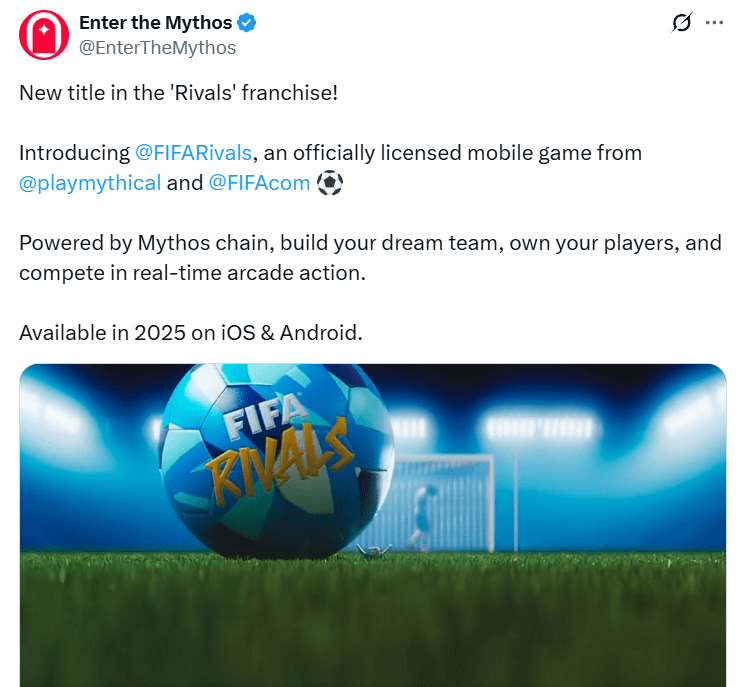The Federation Internationale de Football Association (FIFA), the global governing body for soccer, has announced its selection of Avalanche to power its dedicated blockchain network. This network will focus on non-fungible tokens (NFTs) and enhancing digital fan engagement, marking a significant step for FIFA into the Web3 space. The announcement was made on May 22, signaling a strategic move to leverage blockchain technology for its five billion fans worldwide.
Why Avalanche?
FIFA’s decision to partner with Avalanche stems from its layer-1 (L1) blockchain’s robust infrastructure, specifically designed for scalability. This scalability is crucial for supporting the high transaction volumes expected from a global fan base. The choice was not arbitrary; FIFA conducted a thorough analysis of several key factors, including:
- Performance: Avalanche’s high throughput ensures fast and efficient transaction processing.
- Security: The network’s consensus mechanism provides a secure and reliable platform for digital assets.
- Transaction Fees: Avalanche boasts relatively low transaction fees, making it accessible for a wide range of users.
- Customizability: The platform allows for tailored solutions to meet FIFA’s specific needs.
- Scalability: Crucially, Avalanche can handle the demands of a massive global audience.
- EVM Compatibility: AvaCloud’s Ethereum Virtual Machine (EVM) compatibility allows seamless integration with Ethereum wallets.
FIFA Collect Migration
As part of this initiative, FIFA will migrate its existing NFT marketplace and NFT collection, known as FIFA Collect, to the new Avalanche-powered FIFA Blockchain. This migration represents a significant upgrade, promising a more seamless and engaging experience for users.
Following the migration, external Algorand-based wallets like Pera and Defly will no longer be supported. Instead, users will be able to connect to FIFA Collect via MetaMask or other EVM-compatible wallets that support WalletConnect. This change streamlines the user experience by consolidating wallet compatibility around the widely used Ethereum ecosystem.
The Benefits of Blockchain for FIFA
The move to a dedicated blockchain offers several key advantages for FIFA:
- Enhanced Fan Engagement: NFTs provide fans with unique digital collectibles, creating new avenues for engagement and interaction with the sport.
- New Revenue Streams: The NFT marketplace can generate new revenue streams for FIFA and its partners.
- Transparency and Authenticity: Blockchain technology ensures the authenticity and scarcity of digital collectibles, protecting fans from counterfeits.
- Global Accessibility: A blockchain-based platform allows fans worldwide to participate in the digital ecosystem, regardless of their location.
FIFA’s Previous Forays into Blockchain
This isn’t FIFA’s first venture into the world of blockchain. In November 2024, FIFA partnered with blockchain gaming studio Mythical Games to launch FIFA Rivals, a free-to-play soccer game available on iOS and Android. This partnership demonstrated FIFA’s interest in exploring the potential of blockchain technology in gaming.
Prior to this, FIFA launched its initial NFT collection ahead of the 2023 Club World Cup in Saudi Arabia, in collaboration with blockchain firm Modex. This marked their entry into the NFT space, paving the way for the current partnership with Avalanche.

The Future of FIFA and Blockchain
While FIFA has not yet publicly disclosed its future plans and business cases for the Avalanche-powered blockchain, the potential applications are vast. Possibilities include:
- Digital Ticketing: Secure and verifiable digital tickets can combat fraud and enhance the fan experience.
- Player Data NFTs: Unique NFTs representing player statistics and achievements could be created, offering fans a new way to collect and engage with their favorite players.
- Virtual Stadium Experiences: Blockchain could power immersive virtual stadium experiences, allowing fans to connect with the game in new and innovative ways.
- Governance and Voting: A blockchain-based voting system could increase transparency and participation in FIFA governance decisions.
FIFA’s move to embrace blockchain technology with Avalanche signals a significant shift in how the organization interacts with its global fanbase. By leveraging the power of NFTs and decentralized technology, FIFA aims to create more engaging, transparent, and accessible experiences for fans worldwide. The successful migration and subsequent applications will be closely watched by other sporting organizations and the broader entertainment industry.